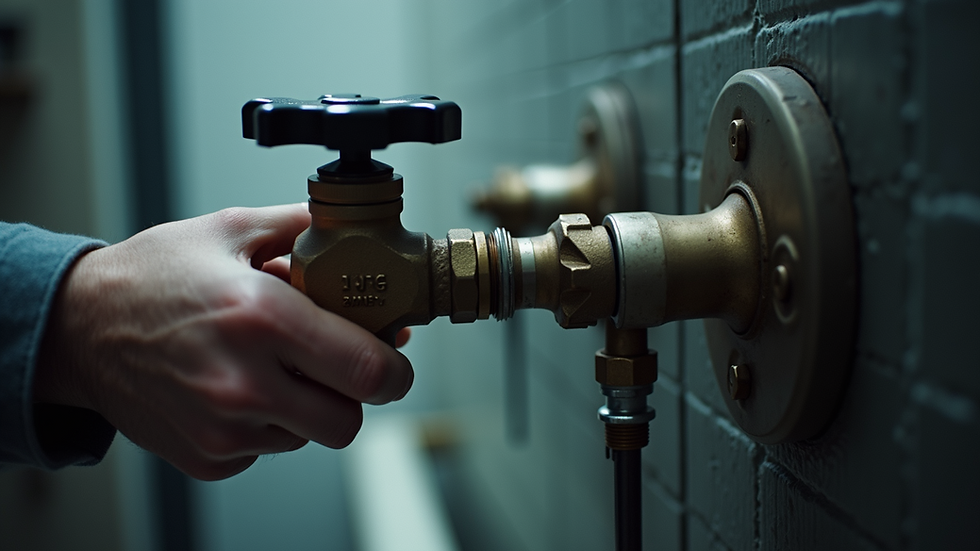The Benefits of Power Flushing: Removing Sludge Buildup for a Cleaner System
- Jamie Smith
- Aug 28, 2025
- 4 min read
Sludge buildup in heating systems is a common problem that many homeowners face. Over time, debris, rust, and other contaminants can accumulate in pipes and radiators. This buildup not only affects the performance of your heating system but can also lead to expensive repairs. One effective way to tackle this issue is power flushing. In this post, we'll explore the numerous advantages of power flushing and how it can help keep your heating system cleaner and more efficient.
Understanding Sludge Buildup
Sludge is a thick, muddy substance formed in heating systems, mainly due to corrosion, dirt accumulation, and the presence of water. It can restrict water flow, resulting in cold spots in radiators, increased energy consumption, and possibly even system failures. A recent study found that up to 85% of heating system issues can be traced back to sludge buildup.
To avoid these problems, regular maintenance is essential. However, if sludge does accumulate, power flushing often proves to be an effective solution for restoring efficiency.
What is Power Flushing?
Power flushing is a process that utilizes a specialized machine to circulate water and cleaning chemicals through the heating system at high pressure. This method dislodges sludge, rust, and debris from pipes and radiators, facilitating a thorough cleaning.
The power flushing process typically includes these steps:
System Preparation: The heating system is powered down, and the radiators are drained.
Chemical Treatment: A cleaning solution is added to help break down sludge and corrosion.
Power Flushing: The power flush machine is connected, allowing water to circulate at high pressure, dislodging sludge and debris, which is then flushed out.
System Refill: After flushing, the system is refilled with clean water, and corrosion inhibitors are added.
Testing: Finally, the system is tested to confirm it is running efficiently.
Benefits of Power Flushing
Enhanced Efficiency
One of the main benefits of power flushing is improved system efficiency. By removing sludge, the heating system can operate more effectively. Homeowners often report energy savings of 10% to 30% on their heating bills after a power flush. A cleaner system requires less energy to heat your home, translating into real savings.
Greater Comfort
Sludge buildup can lead to uneven heating in your home with some areas remaining cold. Power flushing restores balance to the heating system, ensuring that every room receives adequate warmth. Imagine coming home to a uniformly warm environment, especially during cold winter days—a significant improvement for comfort.
Longer System Lifespan
Regular power flushing can help extend the life of your heating system. By removing harmful sludge and corrosion, you significantly lower the risk of breakdowns. Systems that undergo regular maintenance, including power flushing, can last well over 15 years, compared to those that do not, which might only last 10 years.
Reduced Breakdown Risks
Heating systems affected by sludge are more susceptible to breakdowns. Power flushing minimizes this risk by maintaining a clean system that functions smoothly. Being proactive with maintenance can save you from unexpected repairs and the inconveniences they bring.
Improved Water Quality
Another significant benefit is the enhancement of the water quality circulating through your heating system. Power flushing removes contaminants, ensuring that the water used is clean and free from harmful elements. This leads to a healthier environment in your home.
When to Consider Power Flushing
Being proactive about your heating system’s upkeep is essential. Here are signs indicating that power flushing might be necessary:
Cold Spots in Radiators: If you notice certain radiators are not heating properly, it may signal sludge accumulation.
High Energy Bills: A sudden spike in heating costs may indicate your system is working harder due to inefficiencies caused by sludge.
Noisy Radiators: Gurgling or banging sounds can signal trapped air or sludge buildup.
Age of the System: Older heating systems, especially those over 10 years old, are more likely to accumulate sludge. Scheduling a power flush should be a part of regular maintenance.
Choosing a Professional for Power Flushing
While you might consider power flushing a DIY project, it's often best handled by experienced professionals. They possess the know-how and tools to perform the job safely and correctly. When selecting a professional for power flushing, keep these points in mind:
Experience: Look for a technician with a solid reputation in heating system maintenance and power flushing.
Reviews: Consider online reviews and testimonials to understand the quality of the service the technician offers.
Certifications: Ensure that the technician meets industry standards and is certified for safety and efficiency.
Wrapping Up
Power flushing is a reliable solution for eliminating sludge buildup in heating systems, leading to improved efficiency, enhanced comfort, and a longer lifespan for your system. By being attentive to maintenance and recognizing the signs of sludge build-up, you can ensure your heating system operates at peak performance. If you suspect sludge is affecting your system, don't hesitate to contact a professional to explore your options. Investing in a power flush now can yield significant savings and increased comfort in the years ahead.






Comments